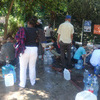Pregnant women in South Africa suffer at hands of violent partners
17 July 2018 | Story Tanya Farber. Photo Andrea Bertozzini Unsplash Read time 4 min.
Many South Africa women‚ already in difficult situations‚ are experiencing violence during pregnancy at the hands of their intimate partners‚ a new study from UCT has found.
Of the 376 women who took part in the research‚ 15% had experienced intimate partner violence during pregnancy‚ with forms of abuse ranging from sexual and physical to emotional and verbal.
This is against a backdrop of South Africa having intimate partner violence (among all women‚ not just those who are pregnant) which is double that of the United States, according to the study‚ and which is as high as 71% in some communities.
Of the 376 women who took part in the research‚ 15% had experienced intimate partner violence during pregnancy‚ with forms of abuse ranging from sexual and physical to emotional and verbal.
The sample was drawn from women attending antenatal services at a primary-level maternity facility in Cape Town. An in-depth analysis of some cases revealed that the violence some of the women were experiencing was not only perpetrated by their intimate partners, but also by other members of their household.
The researchers found that the high level of violence during pregnancy was associated with poverty-related factors including food insecurity‚ mental ill-health‚ unemployment‚ unwanted pregnancies and past experiences of abuse.
“In its most severe form‚ violence against pregnant women has been reported as a contributing cause of maternal deaths‚” said researchers Sally Field‚ Michael Onah‚ Thandi van Heyningen and Simone Honikman – all part of the Perinatal Mental Health Project.
The researchers found that the high level of violence during pregnancy was associated with poverty-related factors including food insecurity‚ mental ill-health‚ unemployment‚ unwanted pregnancies and past experiences of abuse.
It has also been associated with “inadequate uptake of antenatal care‚ with abused women being more likely to delay seeking pregnancy care and to attend fewer antenatal visits.” They added that a they found a strong association between thoughts of suicide in pregnant women and their having experienced domestic violence.
They said that in South Africa‚ “high levels of violence occur within a context of multiple contributing social dynamics. These include prominent patriarchal norms where masculinity is associated with defence of honour‚ harshness‚ and risk taking.”
They added: “Poverty and gender inequalities contribute to the structural determinants of violence.”
Cape Town water crisis
At UCT our researchers have been analysing the causes of the current drought, monitoring water usage on campus and in the city, and looking for ways to save water while there is still time. As part of UCT’s water-saving campaign, all members of the campus community are encouraged to reduce their water use by half, which will help Cape Town to meet its water-use goals and ensure a water-sustainable university in the future.



























